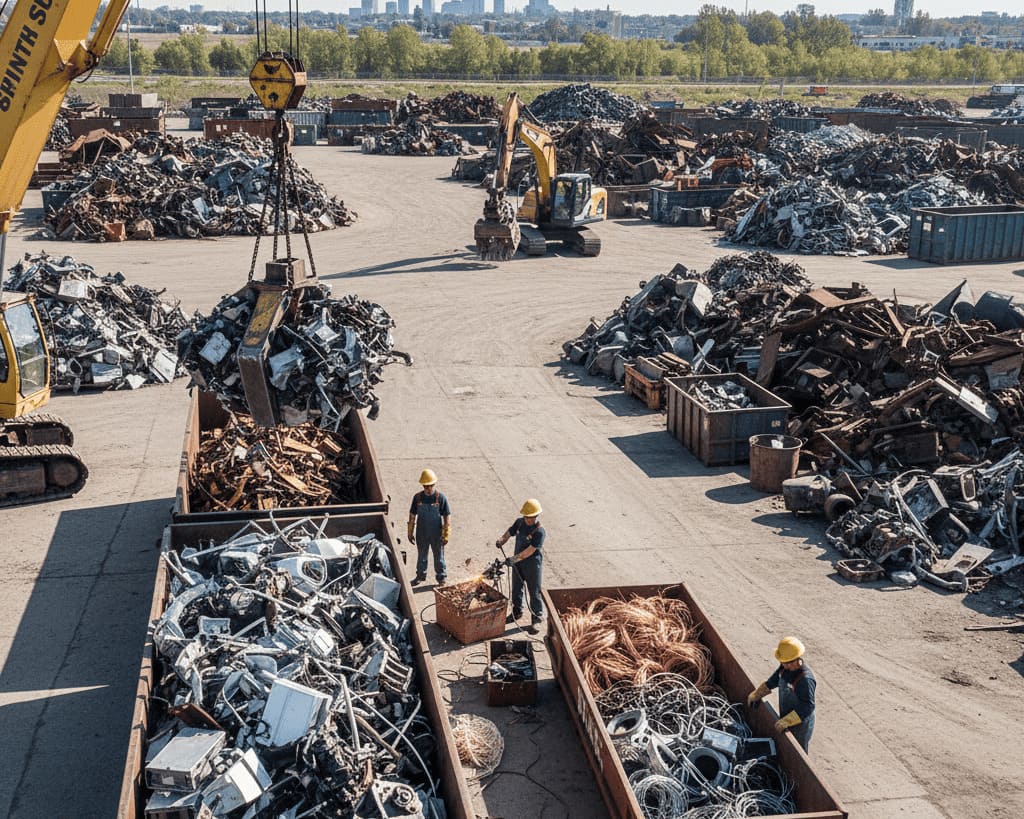If your garage, shed, or yard is filling with old appliances, scrap metal, gutters, or fencing, a reliable metal recycling services partner makes cleanup simple and responsible. Winnipeg has a mix of municipal drop-off options, private scrap yards, and haulers that collect and route metal for recycling. This guide explains how metal recycling works in Winnipeg, what local options are available, how to prepare and sort metal at home, and how to choose the right service for your project. I’ll also explain how Mr Garbage helps homeowners with pickup, bin rentals, and routing to approved processors.
This article is written for Winnipeg homeowners who want clear, local steps with practical examples, trustworthy sources, and easy actions you can take today.
Why use professional metal recycling services in Winnipeg
Proper metal recycling services keep valuable materials in the supply chain and prevent hazardous disposal. Metal is one of the most recycled materials worldwide: when properly collected and processed, scrap metal becomes feedstock for new products, saving energy and reducing the need for mining.
For homeowners, professional services offer clear advantages:
- They handle large, awkward items safely.
- They separate ferrous and non-ferrous metals for proper processing.
- They route material to licensed processors or scrap yards that accept specific metal types.
- They keep metals out of landfill and help Winnipeg meet diversion goals.
Local businesses like Industrial Metals and Urbanmine perform commercial and residential metal recycling in Winnipeg; many offer drop-off, container services, and scheduled pickups for larger loads. Working with a local hauler that knows these processors saves time and ensures material is accepted.
Local collection options
Winnipeg homeowners have several practical options to recycle metal:
Municipal 4R depots and Brady Road
The City of Winnipeg operates 4R depots that accept many household recyclables, including certain metals and appliances. The Brady Road Resource Management Facility and 4R depots are key municipal access points for residents to drop off accepted items. Before you go, check the depot’s accepted item list and any limits on commercial loads.
Scrap yards and private processors
Winnipeg has dedicated scrap yards and processors that accept a wide range of ferrous and non-ferrous metals: steel, copper, brass, aluminum, and stainless steel. These processors may accept loose loads, bundled scrap, or offer container/bin services for larger cleanouts. Examples include local yards that advertise residential and commercial services. Using a scrap yard is often the fastest way to ensure your metal goes straight to remelting and reuse.
Pickup and bin rental options
If you can’t transport material yourself, haulers and recycling firms can deliver bins or schedule curbside pickup. For home cleanouts, a bin rental from a local provider allows you to load metal alongside other recyclable material; the hauler will separate metals at a facility or route them directly to a scrap yard. Mr Garbage coordinates bin delivery and can advise whether a mixed bin or dedicated metal pickup is the best option for your job.
Common household metals and how to prepare them
Knowing what counts and how to prep it speeds recycling and prevents rejected loads.
Commonly accepted items
Acceptable residential metals typically include:
- Old appliances (stoves, fridges; note: fridges need certified refrigerant removal).
- Lawn and garden equipment (mowers with fluids drained).
- Gutters, downspouts, and metal fencing.
- Empty metal paint cans, pipes, scrap steel, aluminum siding, and gutters.
- Small handheld metal items (pots, pans, tools).
Large appliances with refrigerant must be prepared by a certified technician before recycling—don’t attempt to remove refrigerants yourself. For electronics or items with hazardous components, use approved e-waste routes.
Preparation and safety tips
- Drain fluids: Remove oil, gasoline, and other liquids safely and store them separately for proper disposal.
- Remove non-metal parts when practical: Take off cushions, wooden handles, and rubber where you can easily separate materials.
- Bundle small metals: Use wire or rope to bundle scrap steel or copper to make handling easier.
- Keep metals dry and clean: Clean metals are easier to process and more likely to be accepted.
- Label mixed loads: If a bin contains mixed materials, note which bundles contain copper, aluminum, brass, or steel.
If in doubt, take photos and ask your hauler or local scrap yard—Mr Garbage can advise whether to bring items to a depot or schedule a pickup.
Ferrous vs non-ferrous metals and why it matters
Recyclers separate metals into two broad categories:
Ferrous metals
Ferrous metals contain iron and are magnetic (steel, iron). They are commonly used in structural applications and are widely processed at scrap yards.
Non-ferrous metals
Non-ferrous metals (copper, aluminum, brass, stainless steel) are not magnetic and often have a higher recycling value. Separating these metals increases their recovery efficiency and keeps processing lines clean.
Sorting by metal type at the point of collection improves the value and quality of the recycled material. Haulers and processors value clean, separated loads and will often ask you to pre-sort where feasible. Industrial Metals
Benefits of metal recycling services
Recycling metal is both environmentally and economically sensible.
- Environmental: Recycling metal saves energy compared with producing metals from ore and reduces greenhouse gas emissions from mining and smelting. Metals are infinitely recyclable without losing quality, which makes their recovery especially valuable.
- Economic: Recovered metal becomes raw material for local foundries and manufacturers. Local recycling activity supports jobs in collection, processing, and remanufacturing.
Statistics Canada and industry reports underscore the scale and importance of diversion activities across Canada, where recycled materials are a meaningful share of total diverted waste. Winnipeg’s contribution through municipal and private programs feeds into that national network. Statistics Canada
How to choose the right metal recycling services provider
Selecting a reputable provider means thinking beyond convenience.
Key vetting questions
Ask potential providers these simple questions:
- Where will my metal actually go, what processor or scrap yard?
- Do you handle the separation of ferrous and non-ferrous metals?
- Can you collect bulky appliances, and do you manage refrigerant recovery for fridges and freezers?
- Do you provide documentation of pickup and final destination if I need records?
- Are you local and familiar with Winnipeg depots and Brady Road routing?
A reliable local provider like Mr Garbage works with vetted processors, can place the right bin, and ensures metals are routed to licensed yards. We also help arrange appliance servicing (like refrigerant recovery) when required. winnipeg.ca
How homeowners and contractors use metal recycling services
Concrete local examples help illustrate how this works in practice.
Residential cleanout: River Heights
A homeowner clearing a garage collected an assortment of old tools, steel shelving, and a broken lawnmower. Mr Garbage delivered a mid-size bin, advised on draining fluids, and arranged a pickup that routed sorted metals to a local scrap yard. Usable hand tools were set aside for donation.
Renovation site: St. Boniface
A contractor removing interior metal studs and HVAC ductwork scheduled a metal recycling pick up. The hauler provided roll-off bins and coordinated with a processor that accepted separated non-ferrous metals. The contractor avoided extra trips to depots and received documentation showing materials were recycled.
These examples show that planning and using a local hauler can make recycling more efficient and ensure materials are handled properly. Industrial Metals
Safety, regulations, and special handling
Some metal items need special handling under regulations.
Appliances and refrigerants
Fridges, freezers, and air conditioners contain refrigerants that must be removed by certified technicians. A responsible recycler will either require proof of refrigerant recovery or arrange pickup with a service that provides compliant removal.
Hazardous components
Items like batteries, electronic components, and fluorescent tubes need separate processing. Never mix batteries or electronics with general metal scrap; these require specialist handling. Use e-waste programs or designated drop-offs for these materials. Recycle My Electronics
Practical services for Winnipeg homeowners
Mr Garbage offers a local, practical approach to metal recycling:
- On-site advice: We help identify metals and advise on separation and safe preparation.
- Bin rentals: Yellow bins are delivered and left for loading at your convenience. We can recommend a dedicated metal bin if your job is metal-heavy.
- Pickup and routing: We collect and route metals to vetted local processors or 4R depots, coordinating any special appliance servicing needed.
- Documentation: For larger jobs or commercial clients, we can provide pickup confirmation and routing details.
If you have a cleanout or need help preparing a mixed load, call Mr Garbage at (204) 999-5865—we’ll guide you through the safest, most recyclable route for your metal.
Common mistakes to avoid when recycling metal
Avoid these common errors that slow processing and might lead to rejected loads:
- Leaving fluids in engines or gas tanks. Always drain and store fluids separately.
- Mixing hazardous items (batteries, electronics) with general metal scrap.
- Making bundles too heavy for safe handling—keep bundle sizes manageable.
- Assuming all metals are treated the same—separate copper, aluminum, and steel when possible.
Clear, simple preparation results in faster processing and better recycling outcomes.
The future of metal recycling in Winnipeg
Winnipeg’s combination of municipal depots and private processors is evolving. National and provincial efforts to increase diversion and build processing capacity mean more opportunities for local recycling. Homeowners who sort well and use local services help drive better markets for recycled metal and support local circular economy jobs.
Local processors and haulers are investing in better separation and container services, and partnerships between haulers and scrap yards are making collection more convenient for homeowners. Choosing local metal recycling services keeps material in the regional supply chain and supports Winnipeg’s environmental goals.
Conclusion
Metal is one of the easiest materials to keep out of landfill—if it’s collected and prepared correctly. Winnipeg homeowners have practical options: municipal 4R depots, local scrap yards, and haulers that provide pickup and bin rental services. For a smooth, local solution, Mr Garbage helps you prepare, collect, and route metal to vetted processors so material becomes part of the next product lifecycle.
Ready to clear your metal clutter responsibly? Call Mr Garbage at (204) 999-5865 or visit our Contact page to book pickup, request a bin, or get tailored advice for your Winnipeg home project. Let us handle the heavy lifting and make sure your metal is recycled the right way.
Frequently Asked Questions (FAQs)
Q1: What items do metal recycling services in Winnipeg accept?
A1: Common items include scrap steel, aluminum, copper, old appliances (with proper refrigerant removal), metal piping, gutters, garden tools, and small metal household items. Check your local 4R depot or scrap yard for exact acceptance lists.
Q2: Can a hauler pick up large metal items from my home?
A2: Yes. Many haulers and metal recycling services offer pickup and bin rental options for large or bulky metal loads. If appliances contain refrigerant, certified recovery is required before pickup. Mr Garbage coordinates pickups and any required appliance servicing.
Q3: Should I separate metals before collection?
A3: Where practical, separate ferrous (magnetic) metals from non-ferrous metals like copper and aluminum. Clean, separated loads are easier to process and more likely to be accepted by processors. Your hauler can advise how much pre-sorting is needed.
Q4: Where can I take small amounts of scrap metal myself?
A4: Winnipeg residents can use 4R depots for many household items; dedicated scrap yards also accept residential loads and may offer drop-in service. Check depot hours and scrap yard requirements before you go.
Q5: What happens to my metal after collection?
A5: Metals are sorted by type, cleaned if needed, and then sent to processors for remelting and manufacturing into new products. Non-metal components and hazardous parts are removed and handled separately to meet environmental and safety standards.

